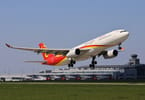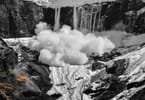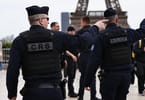BEIJING – The good news for Beijing’s Olympics organizers is that they will have enough water and petrol, but they still need to work on vegetables and tourists.
Final preparations for next month’s Games are in full swing, with booths of smiling volunteers and flower tubs sprouting across the city.
And it seems Herculean efforts to ensure the capital will not run dry, despite several years of drought, have paid off: the main reservoirs feeding the capital are holding more than enough water for the 1 million or more domestic tourists and up to 500,000 foreign visitors expected during the Games.
“Beijing has combined all water resources, including reservoirs, underground water and rainfall, to ensure the supply for the Olympics,” Yu Yaping, a Beijing Water Bureau official, said in remarks reported on Sunday by Xinhua news agency.
To ensure there was no risk of Beijing running short for the Games, officials ordered a 309-km (192-mile) northern section of the larger South-North Water Transfer Project first be completed to pump more water if needed from Hebei, a largely rural province adjoining the capital that is itself acutely short of water.
The authorities are also stockpiling plenty of petrol and diesel, even though cars will be allowed on Beijing’s road only on alternate days from July 20.
PetroChina and Sinopec, China’s two leading oil producers, are expected to import 310,000 tonnes of petrol and 410,000 tonnes of diesel for use in eastern China, according to ChemNet, a chemical and petrochemical industry information website.
By contrast, supplies of vegetables coming into Beijing have dropped about 10 percent recently, pushing up prices by an average 65 percent, according to Wang Xiaodong, the director of the city’s agricultural office.
Xinhua quoted Wang as saying 15 percent fewer trucks transporting vegetables had come into the city in the first 10 days of July because drivers feared falling foul of traffic restrictions being introduced for the Games.
Some checks are already in place, to enhance security and reduce pollution, and they are about go get tougher both in and around the capital.
SERIOUS THREATS
From July 20, authorities in Hebei will check all vehicles headed for Beijing from more than 50 towns and cities, according to a local media report. Security will also be stepped up at airports, railway stations and airports, the report in the Yan Zhao City Journal said.
Travel agents and sports hospitality companies are worried that stifling security, difficulties obtaining visas and recurring warnings about the threat of terrorism will keep many tourists away from the Games, which run from August 8-24.
Five-star hotels are more than 77 percent booked for the Games, but the reservation rate at four-star hotels is only 48 percent and is lower still at more modest hotels, Xiong Yumei, vice-director of the Beijing Tourism Bureau, said on Friday.
A 100,000-strong anti-terrorism force is in place, surface-to-air missiles have been deployed around major venues and bag searches are being conducted on the subway.
Rights groups say China is using Olympic security as an excuse to crack down on internal dissent, particularly in Tibet, the scene of deadly anti-Chinese rioting in March, and in the restive, mainly Muslim western region of Xinjiang.
But the semi-official China News Service on Sunday defended the strict security, saying the threats China faced were greater than those at any previous Olympics.
The rioting in Tibet and recent armed clashes in Xinjiang pointed to a real risk that the Games could be sabotaged, the news agency said in an unsigned commentary.
“For China, the complexity of the international situation and of the political environment have become clear. It cannot be denied that the dark cloud of terrorism is approaching China’s border,” it said.
The agency said 80 heads of state would attend the opening ceremony.
in.reuters.com
WHAT TO TAKE AWAY FROM THIS ARTICLE:
- To ensure there was no risk of Beijing running short for the Games, officials ordered a 309-km (192-mile) northern section of the larger South-North Water Transfer Project first be completed to pump more water if needed from Hebei, a largely rural province adjoining the capital that is itself acutely short of water.
- The rioting in Tibet and recent armed clashes in Xinjiang pointed to a real risk that the Games could be sabotaged, the news agency said in an unsigned commentary.
- Rights groups say China is using Olympic security as an excuse to crack down on internal dissent, particularly in Tibet, the scene of deadly anti-Chinese rioting in March, and in the restive, mainly Muslim western region of Xinjiang.






















